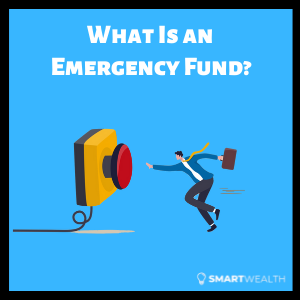A 2020 survey by HSBC showed that unexpected expenses and reduction of income are 2 of the top 3 financial concerns of all respondents across all financial fitness levels.
Ironically, a separate survey showed that only 1 in 3 Singaporeans have enough put away to last them 6 months.
Most of us are worried about these unexpected expenses but only a third of us are prepared to face it; only a third have what most financial advisors would consider as a good sized emergency fund.
What Is an Emergency Fund?
What is an emergency fund anway? It really is nothing technical. It is simply an amount of money you set aside for an emergency.
However, at this point it would be helpful to point out what it is not:
- It is not part of your savings. Savings are meant for you to build wealth, emergency funds are meant to be a buffer that protects the wealth that you are building. It is there so that you would not have to dip into your savings.
- It is not “spare money” that you can use on a whim. In order to be effective, your emergency fund should be used only for their intended use: for emergencies. This is crucial because emergencies, by definition, cannot be predicted. You never know when you will need your emergency fund. As such, the money should always be there.
- Investments do not count as emergency funds. Investments are different from savings because they stand to accelerate the growth of wealth. In almost all cases there is some degree of risk as well as loss of liquidity. These are 2 things that are not compatible with emergency funds.
SIDE NOTE When was the last time you conducted thorough financial planning or reviewed your finances? In this day and age in Singapore, doing so will absolutely improve the quality of life for you and your loved ones. Here are 5 reasons why financial planning is so important.
The Benefits of Having an Emergency Fund
Why do you need an emergency fund?
Emergencies are costly. What’s worse is, it can potentially send an average, financially fit person into a debt spiral.
True, some emergencies can be dealt with using money you have on hand, like dipping from your savings or even just your spare money that month.
However, there are some that can potentially wipe out your savings and even send you into debt.
Having an emergency fund helps mitigate the effects of these emergencies on your finances. It’s like insurance, but you are both the insured and the insurer.
You cannot predict when emergencies will happen, but you can prepare for them. Without an emergency fund, you run the risk of having to scramble to find money, in which cases you will likely have to rely on debts.
And as it happens, the easiest debts to get cost you the most as they tend to have the highest interest rates. For example, having a handy credit card allows you to spend money you don’t have, but at a steep compound interest. This is why you hear of so many people drowning in credit card debts. The usual story is they end up servicing more interest than money they actually used.
Then there are loans and credit card balance transfers, which may have lower interest but are not as easy to get. In any case, any interest you pay would have been unnecessary if you had a sufficient emergency fund.
It’s just like preparing a “go-bag” for when disasters hit. You think of what are the possible emergencies and you put an item in your bag to help you in case it happens. Emergencies do not necessarily have to be incredible disasters, they are unexpected expenses that will cost you money when they occur. For example:
- Broken home appliance or necessary home repair
- Vehicular accident
- Losing your job
- Personal injury or sickness
- Death of a loved one
These can cost anywhere from a few hundred dollars to thousands. They can also be as simple as a one-time expense or a recurring one. The qualifying thing to remember is that, when they occur, you do not have a choice but to incur an expense. They are typically unexpected but necessary or unavoidable expenses.
It is important to stress this part – they are unavoidable and necessary. Thus only when the expense is both an emergency and necessary should you touch your emergency fund.
Some expenses may seem like emergencies but can be avoided. It’s just human nature to want to rationalise and convince ourselves that something we really really want is “necessary.” For example, in the event of a vehicular accident, it may truly be necessary to incur expenses in renting a vehicle. However, renting the fanciest available vehicle is not necessary.
The same goes for purchases, no matter how good a deal it is, if you can survive without buying it, the emergency fund is not meant for it.
How Much Emergency Funds Should You Have
The amount of the emergency fund depends on the emergencies you are preparing for.
What are the emergencies you want to cover?
It is very important to be realistic in deciding what these emergencies are. Adjusting or skewing your list of emergencies so you don’t have to put in that much defeats the purpose of setting up an emergency fund.
To give you an idea, here are a few average costs of emergency expenses according to Value Champion:
- Moving your home – $374
- Monthly car rental – $2,119
- Heart attack ER visit – $2,603
- Kitchen oven – $3,400
- Funeral – $5,632
Of course, you do not have to add all the cost up and match that amount. The goal is having enough to more or less meet the expense with the highest cost, because if you have enough for that, you would have enough to cover the lower cost ones.
Alternatively, you can cover the loss of income or capacity to earn for an extended period of time. In fact, most experts advise that the amount of the emergency fund should be somewhere between 6 to 12 months worth of living expenses.
As for me, I usually recommend having 12 months rather than 6 months. Now, after seeing how this pandemic has lasted more than a year already, I believe this even more.
3 Steps to Build an Emergency Fund
12 months? That may sound very intimidating. But do not be discouraged, you do not have to come up with this amount overnight. The important thing is you get started now and commit to it. To make this feat less daunting, I’ve broken it down into 3 simple steps.
DID YOU KNOW? According to a survey conducted by MoneySense, about 3 out of 10 Singapore residents aged 30 to 59 had not started planning for their future financial needs. This isn't surprising because personal finance can seem complicated and daunting. But really, there are only a few things that you should focus on. Learn how to significantly improve your personal finances with the 7-step "wedding cake" strategy today.
1) First is deciding how much you need to have
As I mentioned earlier, it’s best to set a goal of having enough to cover 6 to 12 month of expenses.
List down all your monthly expenses starting with the absolute necessities like food, water, rent, debt payments, things you cannot live without and things that will cost you more money if you do not pay. You can use a budgeting template for this.
Hopefully, this only makes up 50% or less of your monthly income. If not, you may want to look into the 50/30/20 budget rule or check out how to budget properly.Then, decide how many months you will want to cover, and simply multiply the monthly expenses by the number of months. Below is an example featuring Jessica’s hypothetical expenses:
| Jessica’s Monthly Expense | Cost |
| Rent | $1,900 |
| Utilities | $150 |
| Internet | $50 |
| MRT top-up | $120 |
| Food | $750 |
| Mobile Phone Bill | $30 |
| Total: | $3,000 |
(Monthly Expenses) x (Number of months) = Emergency Fund Goal
$3,000 x 12 = $36,000
2) Subtract what you have right now
If you are reading this article it is most likely that you will not readily have this amount lying around. (Kudos to you if you do!)
Do not worry, what is important is that you get started and have a realistic plan to reach it. So, once you have gotten your emergency fund goal amount, subtract from it what you currently have set aside as an emergency fund.
3) Set a date to reach that amount
Next is coming up with a plan to reach your emergency fund goal.
How long it would take you to reach this emergency fund goal depends on how much your monthly income is and how much of it you can save.
Make sure to set a realistic goal. One that is challenging but doable. Set a date and divide the shortfall between your emergency fund goal and what you currently have into the number of months between now and that date. That’s what you’ll need to put into your emergency fund every month.
Where to Put Emergency Funds in Singapore?
Emergency funds need to be extremely liquid. You’ll need to get as close to cash in your pocket as possible in terms of liquidity, just something safer. This is because you never know how much time you’ll have to get it when the emergency strikes. So, don’t put into bonds or instruments, or lend it to friends for “safekeeping.”
Do not put it somewhere you can only access it during normal business hours or will have to clear a bunch of paperwork to get it. Ideally it can be something you can access in the middle of the night on a holiday.
A regular savings account which you can withdraw from via atm or transfer via an app is an easy option. This ensures that the money is protected and you have quick access whenever you need it.
Another option is putting it into special types of insurance savings plans which could give you slightly higher interest. An example would be the SingLife account. It’s a fair option and there is no lock-in period.
As a final note, I would like to add that your emergency fund should be enough to cover 12 months of expenses and not too much more. This is because with the liquidity it provides, you will probably get very low interest on it.
This means your emergency fund, which should be a sizeable sum, and depending on where you put it, will devalue over time due to inflation. You would be better off looking at other alternatives to invest the excess.


